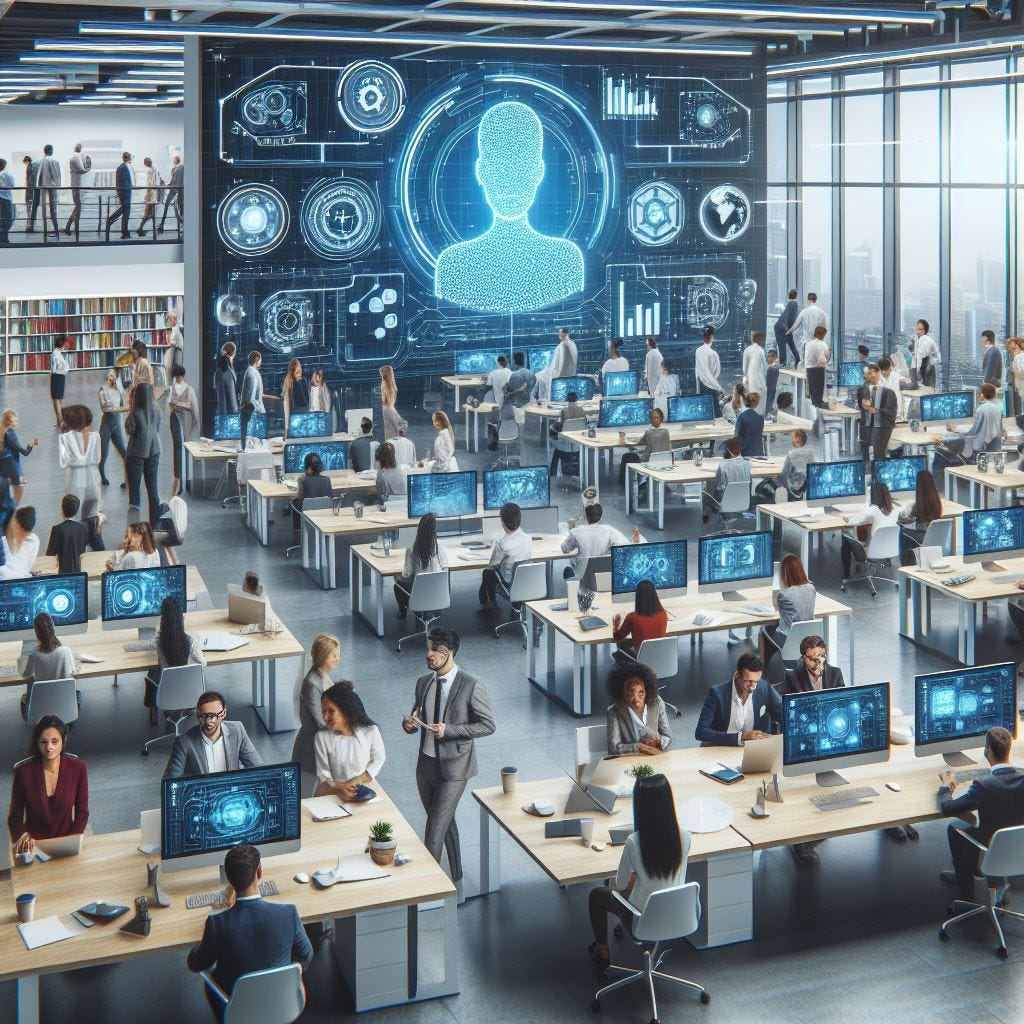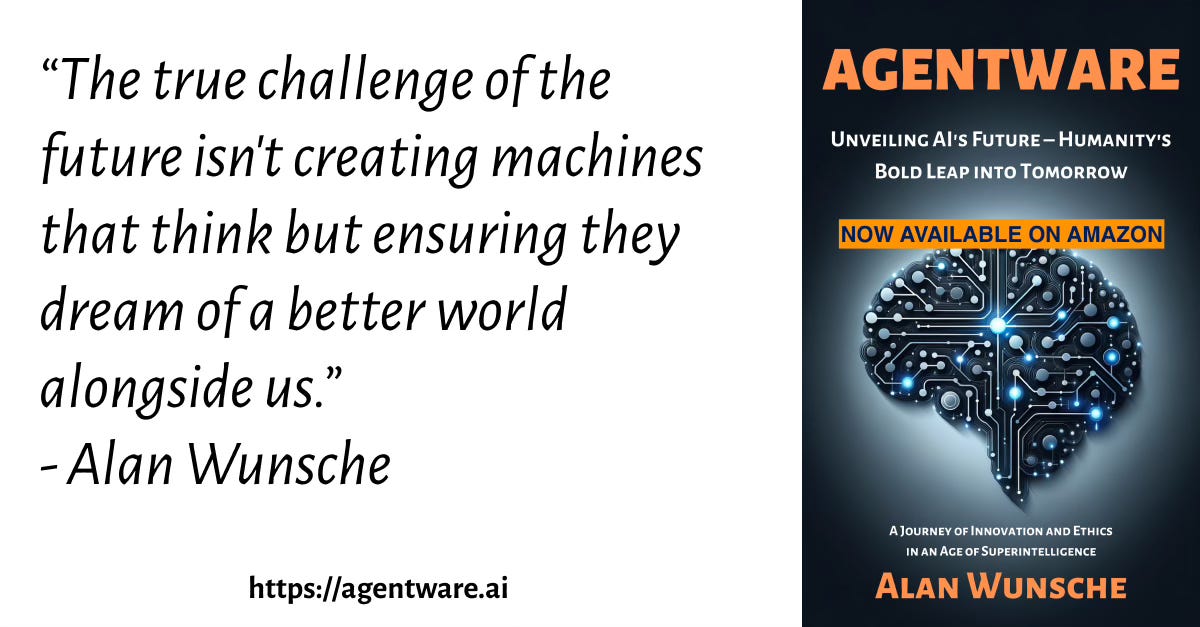White collar job transformation, reskilling and the critical need for HR leadership to employ AI responsibly features prominently in my book “AGENTWARE”, as AI agents and assistants promise to automate most digital business processes.
Today, we reflect on an enlightening article in the WSJ: “AI Is Starting to Threaten White-Collar Jobs. Few Industries Are Immune.” (Note: Key Discussion Points and Takeaways follow below)
The rapid advancement of artificial intelligence (AI) technology is reshaping the job landscape, bringing significant changes to white-collar professions. Companies across various sectors, including tech giants like Google and educational platforms such as Duolingo, have started to feel the impact, with recent layoffs underscoring a broader trend. The introduction of generative AI and machine learning into the workplace is not just about enhancing efficiency; it's about fundamentally changing the nature of many jobs.
Generative AI is distinguished by its ability to generate new content and ideas, tasks traditionally associated with human intellect and creativity. This capability extends AI's potential impact beyond simple task automation to the realm of roles involving critical thinking and decision-making, traditionally seen as the domain of middle and high-level managers.
During a recent tech conference, the conversation around AI's influence on the job market highlighted a stark reality: some positions, especially in management, may not return as AI technologies continue to evolve. This evolution suggests a potential restructuring of job roles and hierarchies within companies, affecting industries from tech to manufacturing.
The adaptation to AI is evident in the strategic decisions of several companies. Some are trimming their workforce in anticipation of AI-driven efficiencies, while others, like the chemical firm Chemours, project a reduction in hiring needs as AI takes on more operational tasks such as routine financial management tasks.
Job cuts specifically attributed to AI have been documented, with industries related to media and technology being notably affected. However, the embrace of generative AI is also leading to a surge in its use among professionals, enhancing productivity across a wide range of fields from financial services to marketing.
This shift towards AI-driven processes does not merely signify job displacement; it also hints at the transformation of job descriptions and the skills required for future roles. Entry-level positions might soon carry responsibilities that were previously associated with first-level management, suggesting a potential flattening of corporate hierarchies.
Despite the challenges posed by AI to traditional employment models, there is optimism that AI could enhance the nature of white-collar work. By automating routine tasks, AI allows professionals to engage in more meaningful and strategic activities, potentially enriching their careers and contributing to their companies' success in new ways.
Sources:
AI Is Starting to Threaten White-Collar Jobs. Few Industries Are Immune. February 12, 2024. https://www.wsj.com/lifestyle/careers/ai-is-starting-to-threaten-white-collar-jobs-few-industries-are-immune-9cdbcb90?st=f63db09qn28hax2
Discussion Questions:
As we delve into the ramifications of generative AI's impact on white-collar jobs, let's consider these critical questions for reflection and discussion within our organizations:
Workforce Transformation: How might the rise of generative AI necessitate a reevaluation of job roles and skill sets within your organization, especially in managerial and other white-collar positions?
Strategic Adaptations: Given the potential for AI to automate or enhance tasks traditionally performed by humans, what strategic shifts should your company consider to stay competitive and innovative?
Training and Development: As AI begins to take on more complex tasks, what kind of training and development programs will be necessary to prepare your workforce for the evolving job landscape?
Ethical and Social Implications: How should your organization address the ethical and social implications of implementing AI technologies that could displace jobs or significantly alter workforce requirements?
Future Hiring Practices: With the prediction that companies may need fewer new hires due to AI efficiencies, how might your hiring strategies and workforce planning evolve in response to these technological advancements?
The Takeaways
The rapid advancement of generative AI is poised to redefine the landscape of white-collar employment, offering both challenges and opportunities for innovation and efficiency.
This technological shift is not merely about job displacement but involves transforming job roles, requiring a reevaluation of skills and functions within organizations.
The potential for AI to automate complex tasks and processes presents a unique opportunity to enhance productivity and focus human talent on more strategic and creative endeavors.
Businesses and professionals must adapt to these changes by embracing lifelong learning, investing in AI literacy, and reimagining their operational models to leverage the capabilities of AI.
The dialogue around AI's role in the future of work emphasizes the need for ethical considerations, particularly in terms of data privacy, job displacement, and the equitable distribution of AI's benefits.
If you are interested in the future of AI agents in enterprise, I encourage you to check out “AGENTWARE”, now available in Paperback: AGENTWARE: Unveiling AI's Future – Humanity's Bold Leap into Tomorrow (Amazon link)
AGENTWARE : 🎉 Paperback now available!
Great news!! The paperback version is now available for order! Now that the paperback is shipping, I’ll be sharing insights and concepts from the book here in the newsletter.Thanks for reading AGENTWARE! Subscribe for free to receive new posts and support my work.



